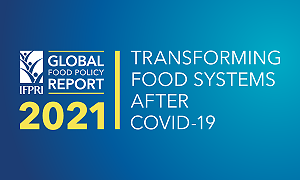The CGIAR results framework includes annual reporting of the major innovations and policy contributions from CGIAR research funded through the CRPs.
Search
Women’s voices in civil society organizations: Evidence from a civil society mapping project in Mali
Tremendous optimism prevails around bottomup accountability — a situation in which citizens effectively hold their government to account.
This learning brief captures the experience of a large Resilience Food Security Activity, USAID – Titukulane, in responding to COVID-19 in Malawi.
Soil health and gender: Why and how to identify the linkages
In this paper, we utilize decomposition methods to document the extent and drivers of the performance gap in Malawi between firms with a female owner and firms with a male owner.
Fix the system!
Millions of people go to bed hungry every night. With enough food on our planet to feed everyone, this need not be the case. The African scientist Jemimah Njuki explains how this could be changed and why women have an important role to play.
2021 Global food policy report: Transforming food systems after COVID-19: Synopsis [in Chinese]
2020年在诸多方面都让我们始料未及。新冠肺炎(COVID-19)疫情为全球带来了一场大规模的公共卫生灾难,各国均陷入了疫情及其相关应对政策带来的不同程度的经济困境,面临服务严重中断和人员流动严重受限的局面。无论是富裕国家还是贫穷国家,均未能幸免。在中低收入国家,许多弱势群体直接面临食物安全、医疗和营养方面的威胁。丧失生计、营养不良、教育中断和资源枯竭造成的长期影响可能性非常巨大,特别是对许多国家来说,距离新冠肺炎疫情的结束还遥遥无期。
The coronavirus pandemic has upended local, national, and global food systems, and put the Sustainable Development Goals further out of reach. But lessons from the world’s response can help address future shocks and contribute to change.
Food systems need to be transformed if we are to meet the Sustainable Development Goals and increase resilience of these systems to shocks. The pandemic has provided useful lessons on opportunities and weaknesses that must be addressed.
The coronavirus pandemic has upended local, national, and global food systems, and put the Sustainable Development Goals further out of reach. But lessons from the world’s response can help address future shocks and contribute to change.
Toward inclusive food systems: Pandemics, vulnerable groups, and the role of social protection
Vulnerable groups have been most affected by disruption to food systems, such as lockdowns, through loss of employment and incomes. Social protection has a key role to play in times of health and economic shocks.
2021 Global food policy report: Transforming food systems after COVID-19: Synopsis [in Arabic]
Abstract Text Here
2021 Global food policy report: Transforming food systems after COVID-19: Synopsis [in Russian]
2020 год был во многом беспрецедентным.
L’année 2020 a été une période inédite à bien des égards.
El año 2020 fue un año sin precedentes en muchos sentidos.
Migration, labor and women’s empowerment: Evidence from an agricultural value chain in Bangladesh
As a substantial portion of the rural labor force migrates to urban areas, it is commonly assumed that women could take over traditionally male tasks in agricultural production, with potentially empowering outcomes for women.
Objectives: Experience of intimate partner violence (IPV) is associated with adverse health and psychosocial outcomes for women. However, rigorous economic evaluations of interventions targeting IPV prevention are rare.
There is growing interest in the potential of women’s groups to improve health.

